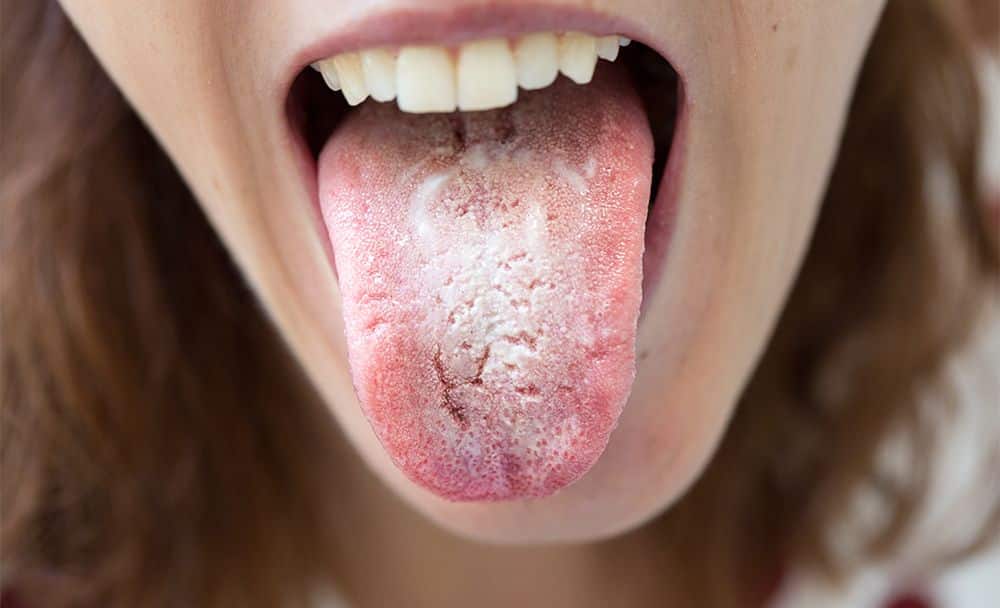This article is reviewed by an expert

The tongue is an important organ in the human body that plays a crucial role in speech, taste, swallowing, digestion and breathing. However, like any other body part, the tongue is susceptible to infections. Tongue infections can be varied and may range from fissured or scrotal tongue and benign migratory glossitis to Ludwig angina infection, where the tongue tends to grow in size about two or three times. These conditions can be uncomfortable and painful, causing difficulties in eating, speaking, and breathing. [1] This article will explore the causes, tongue infection symptoms, tongue infection treatment, and more related to tongue infections.
Causes of Tongue Infection:
There are several causes of tongue infection, ranging from viral and bacterial infections to fungal overgrowth. Here are some common causes:
Candidal infection [2]:
Oral thrush or oral candidiasis, is a kind of fungal infection caused by the Candida fungus. It can affect the tongue and other parts of the mouth, leading to white or yellowish patches on the tongue’s surface. [3]
Tobacco use [2]:
Tobacco smoking can increase the risk of tongue infection and develop into oral precancerous and cancerous lesions. The chemicals and toxins in tobacco can irritate the tongue and weaken the immune system, making it more susceptible to infections. [4]
Nutritional deficiencies [2]:
Nutritional deficiencies, such as deficiencies in vitamin B12, iron, folic acid, riboflavin, and niacin, can contribute to tongue infection. [2] These deficiencies can weaken the immune system and impair the tongue’s ability to fight off infections, making it more prone to infection. [5]
Geographic Tongue [2]:
Geographic tongue is medically termed as benign migratory glossitis. It is a condition characterized by irregular, smooth, and red patches on the surface of the tongue. [6]
Accidental tongue Injury:
Tongue infections can also result from injury to the tongue, such as accidentally biting the tongue, burns from hot foods or beverages, or excessive tooth brushing. [7]
Viral Infections:
Viruses like the herpes simplex virus (HSV) can cause tongue infections. HSV infections can lead to painful sores or malaise, and fever. [11]
Bacterial tongue infection:
Certain bacteria, such as Streptococci and anaerobes, can cause tongue infections. These infections may occur due to poor oral hygiene, a weakened immune system, or injuries to the tongue. [12]
Symptoms of Tongue Infection:
The tongue infection symptoms can vary depending on the underlying cause. Here are some common symptoms associated with tongue infections:
- Pain and Discomfort
- Swelling
- Redness and Inflammation
- Loss of taste [8]
- White or Yellow Coating
- Sores or Blister [3]
- Difficulty eating, drinking, swallowing or speaking [10]
Treatment of Tongue Infection:
The treatment of a tongue infection depends on its underlying cause. Here are some common treatment options:
Antifungal Medications:
In the case of oral thrush, antifungal tongue infection medicine such as fluconazole or nystatin may be prescribed to eliminate the yeast infection on tongue. [9]
Topical Medications:
In some cases, topical tongue infection medicine such as antifungal or antibacterial mouthwashes or gels may be recommended to treat tongue infections. [9]
Maintaining Oral Hygiene:

Good oral hygiene practices are essential in preventing and managing tongue infections. This includes regular brushing of teeth and tongue, flossing, and using an antimicrobial mouthwash. [8]
Antiviral Medications:
Antiviral tongue infection medicine like acyclovir may be prescribed to treat viral tongue infections caused by the herpes simplex virus. [11]
Antibiotics:

If a bacterial infection is suspected, antibiotics and tongue infection medicine such as spiramycin, erythromycin, josamycin, and myocamycin may be prescribed to combat the infection. [12]
FAQs
When should you seek medical attention in case of a tongue infection?
While mild cases of tongue infection can often be managed at home, there are situations where medical attention should be sought. These include:
Severe Pain or Swelling:
If the pain or swelling worsens and affects your ability to eat, drink, or breathe properly, immediate medical attention is necessary.
High Fever:
If you develop a high fever and tongue infection symptoms, it may indicate a more severe infection requiring medical intervention.
Difficulty Swallowing or Breathing:
If you experience difficulty speaking, breathing, or swallowing due to a tongue infection, seek medical help immediately.
Recurring Infections:
If you have a history of recurring tongue infections, it is important to consult a doctor to detect the underlying cause and develop an appropriate treatment plan.
How can you prevent a tongue infection?
While some tongue infections may be unavoidable, there are preventive measures that can reduce the risk of developing an infection, such as:
Maintain Good Oral Hygiene:
Brush your teeth and tongue regularly, floss daily, and use an antimicrobial mouthwash to keep your mouth clean and reduce the chances of infection.
Avoid Sharing Personal Items:
Avoid sharing items like toothbrushes, utensils, or cups with others to prevent spreading infections.
Stay Hydrated:
Drinking adequate water helps maintain a healthy mouth and prevents developing a dry mouth, which can contribute to tongue infections.
Avoid Irritants:
Be cautious with hot foods or beverages that burn your tongue, and avoid substances that can irritate or damage the tongue.
Manage Underlying Conditions:
If you have underlying medical conditions that may increase the risk of tongue infections, work closely with your healthcare provider to manage those conditions effectively.
What are the most effective Ayurvedic home remedies for tongue infection?
Some of the best Ayurvedic home remedies that may help with tongue infection include:
Gargling with Warm Saltwater:
Mix half a teaspoon of salt in a cup of lukewarm water and use it to gargle several times a day. Saltwater gargles can help reduce inflammation, alleviate pain, and promote healing.
Triphala Mouth Rinse:
Prepare a mouth rinse by steeping one teaspoon of Ayurvedic Triphala powder in a cup of hot water. Let it cool, strain, and use the liquid to rinse your mouth two to three times a day. Triphala’s antimicrobial and anti-inflammatory properties can help combat infections.
Aloe Vera Gel:
Apply fresh aloe vera gel directly on to the affected area of the tongue. The healing properties of Aloe vera can relieve pain and inflammation.
Turmeric Paste:
Mix turmeric powder with a small amount of water to form a paste. Apply the paste to the infected tongue area and leave it on for a few minutes before rinsing. Turmeric has antimicrobial and anti-inflammatory properties that can aid in reducing infection and inflammation.
Herbal Mouthwash:
Prepare a mouthwash by boiling neem or basil (tulsi) leaves in water. Let it cool, strain, and use it as a mouthwash twice daily. Neem and holy basil have antimicrobial properties that can help manage tongue infections.
Oil Pulling:
Swishing your mouth thoroughly with a tablespoon of coconut or sesame oil for nearly 10 to 15 minutes, and then spitting it out, is known as oil pulling. This ancient Ayurvedic practice helps eliminate bacteria and toxins from the mouth, promoting oral health.
Can copper tongue cleaners help with the prevention of tongue infection?
Yes, copper tongue cleaner can help in the prevention of tongue infections. The metal ‘copper’ comes with strong antibacterial properties. Also, copper produces certain enzymes which support the growth of good bacteria in your mouth and keeps infections at bay. For best oral care and effective tongue cleaning, you can use the copper tongue cleaner from the house of Zanducare. This uniquely crafted tongue cleaner can remove foul-smelling bacteria from your tongue, and lower the chances of an infection.
Conclusion
Various factors, including fungal, bacterial, and viral infections and traumatic injuries can cause tongue infection. The symptoms of a tongue infection can range from pain and swelling to the development of white or yellow coatings, sores, or blisters. Tongue infection treatment options include antifungal or antibiotic medications, topical treatments, pain relief, and maintaining good oral hygiene practices. It is important to seek medical attention for severe symptoms or recurrent infections. Following preventive measures and practicing good oral hygiene can reduce the risk of developing tongue infections
Disclaimer:
This article is written from a health and wellness perspective and is not medical advice. Kindly seek the help of a certified medical practitioner before initiating any treatment.
References:
- Anatomy, Head and Neck, Tongue
- Common Tongue Conditions in Primary Care
- Oral thrush in adults
- Effects of Tobacco Smoking on the Dorsum of the Tongue and Buccal Epithelium
- Malnutrition and its Oral Outcome – A Review
- GEOGRAPHIC TONGUE: PATTERN OF PRESENTATION IN A SOUTH WESTERN NIGERIAN TEACHING HOSPITAL
- Oral Mucosal Trauma and Injuries
- Glossitis
- Oral Candidiasis
- Treatment of lingual traumatic ulcer accompanied with fungal infections
- Viral Infections of the Oral Mucosa
- Antibiotic therapy–managing odontogenic infections
















